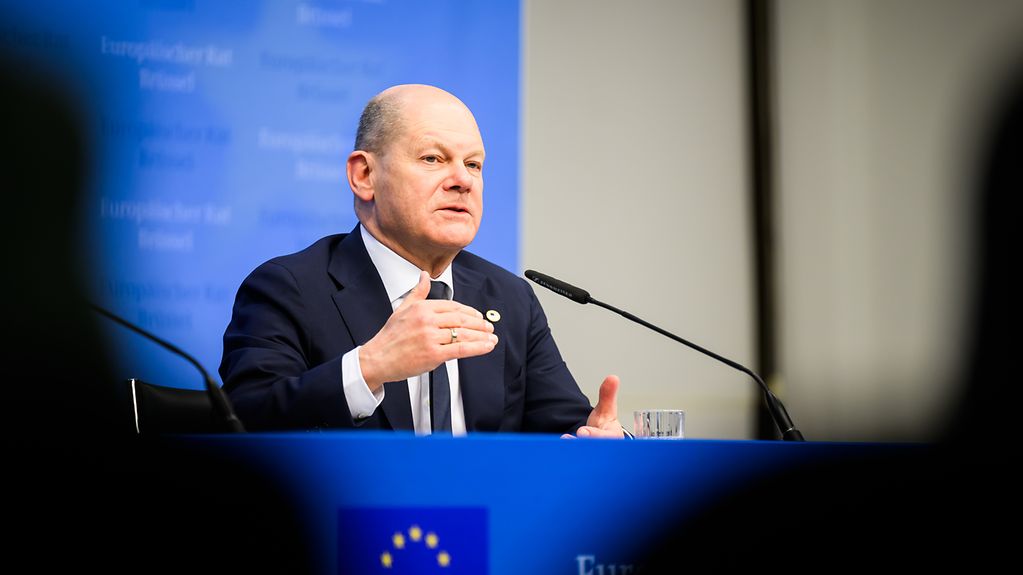Following Iran’s attack against Israel
Following Iran’s unprecedented attack on Israel’s national territory, the Federal Government is making every effort to prevent a conflagration in the Middle East. Federal Chancellor Scholz spoke to Israeli Prime Minister Netanyahu on the phone on Sunday. At the European Council meeting, Scholz and his European counterparts initiated new EU sanctions against Iran.
4 min reading time

Federal Chancellor condemns Iran’s attacks on Israel’s national territory. The picture was taken during the European Council meeting in Brussels.
Photo: Federal Government/Güngör
At their meeting in Luxembourg on Monday, the EU Foreign Ministers also agreed to generally step up the existing sanctions against Iran, in particular in relation to drones and other flying objects. They instructed the EU Representative for Foreign Affairs, Josep Borrell, to draw up a concrete proposal for the new sanctions initiated by the European Council.
New EU sanctions against Iran
At their European Council meeting in Brussels, the EU Heads of State and Government had already agreed on further restrictive measures against Iran, in particular concerning drones and missiles. They announced at the end of the meeting that the European Union was still firmly resolved to contribute to de-escalation and security in the region. The US and the United Kingdom committed to new sanctions, too. Within the G7 these are also supported and coordinated by Germany.
The Federal Chancellor’s phone call with Netanyahu
On Sunday the Federal Chancellor spoke to Israel’s Prime Minister Benjamin Netanyahu on the phone. Scholz highlighted in this conversation that it was still the goal to prevent escalation and a regional conflagration. Netanyahu informed the Federal Chancellor about the situation in the region. Scholz stressed that the Federal Government would continue its close coordination with the G7 partners and within the EU.
De-escalation is the top priority
On the fringes of a conference held on Norderney island off the North Sea coast last week, Federal Chancellor Scholz said: “We are calling on everyone to continue to contribute to de-escalation, which will remain the top priority for the time being.” The Federal Chancellor added that Germany would continue to discuss de-escalation with all its friends and allies and pursue joint efforts in this direction.
Iran’s attack against Israel was also a key topic discussed at the European Council meeting on Wednesday and Thursday. “The global situation is currently dominated by many wars and conflicts,” said Federal Chancellor Scholz at the meeting of the EU Heads of State and Government in Brussels.
Calls for restraint from all parties
Scholz highlighted Germany's solidarity with Israel once again and condemned the Iranian attack on Israel’s national territory with hundreds of drones, missiles and cruise missiles. He said that it was a very good thing that Israel had been able to successfully repel the attack, and that he believed that it was important that Israel did not jeopardise this support and success. The participants of the meeting in Brussels had agreed that “all parties should act with restraint to prevent a conflagration,” the Federal Chancellor said.
The European Council condemned Iran’s attack against Israel clearly and unequivocally, calling on all parties to act with utmost restrained and refrain from doing anything that might exacerbate tensions in the region.
G7 meeting in Capri
Foreign Minister Annalena Baerbock met with her G7 counterparts in Capri. In their final statement issued on Friday, the Foreign Ministers of the G7, which Germany also belongs to, called on all parties in the region to prevent further escalation, and stressed that the G7 would continue to pursue this goal.
Coordination of the sanctions announced by the US was also discussed during the meeting held on the Italian island of Capri. At the weekend, the G7 previously issued a joint statement in which they sharply criticised Iran’s attack and pledged their full support to Israel.
During the night of 14 April, Iran fired cruise missiles directly at Israel from its national territory for the first time. According to Israeli reports, almost all of the hundreds of drones and missiles fired by Iran were repelled. Among the countries supporting Israel in its defence were the USA, the UK and Jordan.
Foreign Minister visits Israel for talks
Foreign Minister Baerbock travelled to Israel for talks on Tuesday to contribute to crisis diplomacy. On this trip she met with Prime Minister Benjamin Netanyahu, Foreign Minister Israel Katz and Minister Benjamin Gantz. According to the Foreign Minister, she told her Israeli dialogue partners unequivocally that “our full solidarity lies with Israel” and that Iran’s actions would “not remain without consequences”.
At the same time, it was essential that “this extremely dangerous situation does not turn into a regional conflagration,” said Baerbock at the end of her trip, adding that everybody now had to act prudently and responsibly. This was her seventh visit to Israel since the Islamist terrorist attack on 7 October 2023.
Protection of Jewish facilities has top priority
“The protection of Israeli and Jewish facilities in Germany has top priority,” said Federal Minister of the Interior Nancy Faeser. Since the terrorist attacks by Hamas on Israel on 7 October 2023, the threat to Israel and to Jews had become even clearer than before, said Faeser, which is why protective measures had been stepped up even further.